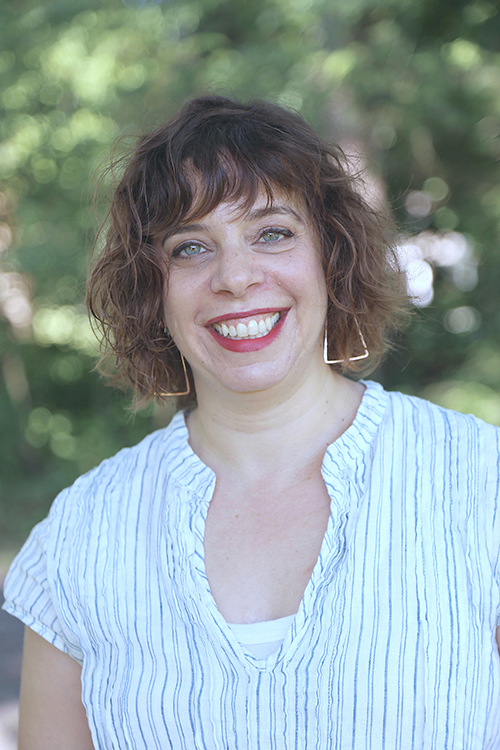
An experimental teaching project illuminates the transformative possibilities of risk-taking in the classroom.
What if college courses were graded not by exams or term papers, but by digital collaboration? What if intellectual risks that didn’t pay off were rewarded rather than dismissed? What if failure could be a positive learning tool? Lauren Rosenblum, PhD, a lecturer in Adelphi’s General Studies Learning Community, is building a revolutionary teaching practice around these questions.
In 2017, Dr. Rosenblum and Laurel Harris, PhD, assistant professor at Rider University, launched a monthlong digital project that aimed to transform their classrooms into egalitarian, conversational spaces. Their introductory core literature classes would take turns compiling an online critical edition of a text—Dr. Rosenblum’s at Adelphi in the fall semester, Dr. Harris’ at Rider in the spring.
Both classes studied Passing, a 1929 novel by Nella Larsen that explores race, gender and sexuality through the turbulent relationship between two childhood friends. Drawing on the work of Black feminist scholars such as Kimberlé Williams Crenshaw, JD, the Combahee River Collective and the Crunk Feminist Collective, Dr. Harris and Dr. Rosenblum asked their classes to consider “how literary texts written by women across geographic, sociopolitical and historical contexts imagine and revise ideas about gender in resonant and dissonant ways.”
Working in groups of four, students investigated specific thematic ideas such as “art, architecture and fashion” and “people and relationships.” Their analysis culminated in multimedia essays with visual and aural components published on Medium, an online blogging platform, which Dr. Harris and Dr. Rosenblum hoped would produce a “provisional community that gave students collective insight into the novel.”
Dr. Rosenblum and Dr. Harris explained the project and published its results in “Passing Through: Feminist Digital Pedagogy and Failure in the General Education Classroom,” an article in the 2019 edition of Transformations: The Journal of Inclusive Scholarship and Pedagogy.

Lauren Rosenblum, PhD, teaches and mentors in Adelphi’s General Studies Learning Community. She researches the intersections between feminism, modernism and pedagogy, and designs curricula to yield more productive learning outcomes for students of color.
The process-oriented nature of digital projects offered a chance to “decenter” traditional modes of learning—a key objective of feminist pedagogy. “We are trying to refocus academia as a site of trial and error, of self-enforced learning, rather than something that is strongly and strictly achievement-based,” Dr. Rosenblum noted. She and Dr. Harris were inspired by the idea of “productive failure,” which prioritizes shared experimentation and playful, imaginative collaboration over a perfect final product.
But failing is a luxury in itself, Dr. Rosenblum points out, and the precarious position of marginalized students may be compounded by risk-taking in the classroom. “Students who need a certain GPA to enter their nursing program or sustain their financial aid package aren’t in a position to ‘play around’ with failure,” she said. “We need to talk about this concept in a way that isn’t paralyzing for them and make sure that, day to day, they can still get what they need.”
She and Dr. Harris were routinely confronted with students’ uneasy relationship to academic experimentation. Some students were unsettled by the project’s amorphous guidelines, which were intended to spark imagination, while others with scant experience in independent critical analysis were unwilling to do close readings of the text. Across the board, students showed little interest in employing digital applications like Voyant Tools or Google Maps to enrich their work.
Four weeks was not enough time to disrupt deeply ingrained classroom habits, the two concluded. A more immersive setting would be ideal, according to Dr. Rosenblum—such as the yearlong General Studies Learning Community. “This project was only possible because of my experience doing small-scale digital projects in General Studies,” Dr. Rosenblum said. “Our learning community offers the kind of experiential learning that can be really life-changing. Now we’re thinking about how we can make those resources available to all students.”
For educators looking to implement their own experimental digital projects, Dr. Rosenblum has a predictable piece of advice: Failure is the best teacher. “Things will not go as you expected them to, but that’s okay,” she said. “You’ll look back and realize it was a beneficial experience.” And with power comes responsibility, she stresses. “If you as a teacher have the ability to play with failure, what can you try to change institutionally? How can you be a mentor and advocate for students? We’re not changing the world here, but we can try to do our part.”
Rosenblum, Lauren M., and Harris, Laurel. Transformations: The Journal of Inclusive Scholarship and Pedagogy, vol. 29, no. 1, 2019, pp. 30-48.